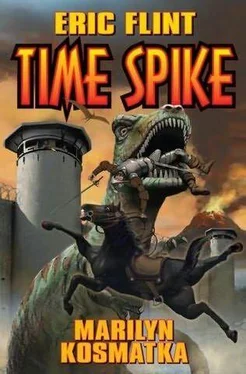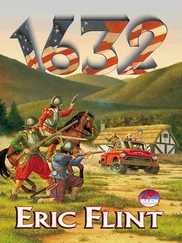Eric Flint - Time spike
Здесь есть возможность читать онлайн «Eric Flint - Time spike» весь текст электронной книги совершенно бесплатно (целиком полную версию без сокращений). В некоторых случаях можно слушать аудио, скачать через торрент в формате fb2 и присутствует краткое содержание. Жанр: Фэнтези, на английском языке. Описание произведения, (предисловие) а так же отзывы посетителей доступны на портале библиотеки ЛибКат.
- Название:Time spike
- Автор:
- Жанр:
- Год:неизвестен
- ISBN:нет данных
- Рейтинг книги:5 / 5. Голосов: 1
-
Избранное:Добавить в избранное
- Отзывы:
-
Ваша оценка:
- 100
- 1
- 2
- 3
- 4
- 5
Time spike: краткое содержание, описание и аннотация
Предлагаем к чтению аннотацию, описание, краткое содержание или предисловие (зависит от того, что написал сам автор книги «Time spike»). Если вы не нашли необходимую информацию о книге — напишите в комментариях, мы постараемся отыскать её.
Time spike — читать онлайн бесплатно полную книгу (весь текст) целиком
Ниже представлен текст книги, разбитый по страницам. Система сохранения места последней прочитанной страницы, позволяет с удобством читать онлайн бесплатно книгу «Time spike», без необходимости каждый раз заново искать на чём Вы остановились. Поставьте закладку, и сможете в любой момент перейти на страницу, на которой закончили чтение.
Интервал:
Закладка:
It looks as though it's been cut at a hundred and twenty degree angle.
One side is blacktop; the other is ground cover. I say 'ground cover' instead of grass because whatever the stuff is-I didn't recognize any of the plants-it isn't grass. Some kind of ferns, is what most of it looked like. Waist-high ground cover and trees. The trees are big, too. I didn't recognize them either, except for a number of gingkos.
But whatever kind of trees they are, they've obviously been there for decades. At least. And out in the distance, I could see trees that were even bigger. Huge things. Trees that have to be hundreds of years old. Could be thousands of years old, for all I know. I thought they were redwoods at first, but Jeff Edelman says my description doesn't quite match. The one thing for sure is they're conifers. In the distance, that's it. Only conifers. "It took me over an hour to get to what should have been the city limits. The truck couldn't go but about a mile or so and I had to walk the rest the way. I found this where I guessed the police station should have been." He held up what looked to be an unadorned, well-worn pocket watch. Instead of a chain, a strip of leather hung from the ring above its winding stem. "The man who used this was leaned against a stump, dead. He was dressed in old-fashioned garb, like for a parade, but different. And from the insect infestation and deterioration of the body, I would say he had been gone for several days." He set the watch back on the table. "That man was all I found. There is no town. No railroad tracks, no cars, buildings, factories, or streetlights. Nothing. No people." He shrugged. "No living people, anyway." "What happened to them?" Joe shrugged again. "It wasn't a bomb or anything like that. This is something else. Nothing is destroyed. It's just… vanished." He waved toward the outer wall, to the area beyond. "And I don't think this is just a local situation. If the sun is wrong here, it's wrong all over the world. And, according to Rod Hulbert, the river is gone.
It hasn't dried up. It's gone. I talked to Jeff Edelman about it. He said moving that much water would have affected other things in other places. It would change things over a wide area. According to him, since the Mississippi is over two thousand miles long, if it's bed is gone, things have to be messed up all over the world." "That's right,"
Edelman said. "It's as though the planet quivered and everything is now different. The tower guards have been spotting strange animals prowling around the perimeter of the prison, and even stranger looking birds. Woeltje says he saw a creature with a hell of a wingspan flying over the prison just a little after sunup, that wasn't anything like any bird he'd ever seen. And there has been an increase in temperature as crazy as what we're seeing in the plant and animal life. This is November and it's eighty degrees out there. And the sun rose six hours ahead of schedule, in thenorthwest. And last night, the stars were wrong. They were in the wrong place, and there were too many of them."
Jenny swallowed, working at staying calm. She could tell by the reactions of those around her, most of what Edelman was saying was old news. But for her, it was all new. She could feel the sweat on her palms and on her upper lip. She looked at Hulbert and knew even though he had already heard most of it, he was taking the situation no better than she was. He looked calm enough, but his respirations were up to sixteen. That was high for him. He was in such unusually good shape, his resting respirations were usually around twelve to thirteen.
Kathleen, the C.O. in charge of the communications and control room, stood up. "I have a husband and three children in town." Her voice changed to almost a wail. "Where are they? What does all this mean?"
The man sitting in the chair next to hers put his arm around her and drew her back down into her seat. Her quiet sobbing filled the room, driving home what had been said. Andy stood and Joe returned to his seat. "It means we have to get ready for a long stay." Hulbert nodded his head and sighed. "Well, I guess now we know." "Know what?" Jenny whispered. Hulbert looked at her and gave a thin grin that held no humor. "We know we're fucked."
Chapter 8 Geoffrey Watkins sat next to what was left of the small fire used to heat their afternoon meal. He didn't do so for the warmth. That was hardly needed now. It just gave him something to do.
The women and children lay in the shade. The old men sat next to the women, watching the woods. The soldiers had their camp by some trees not far away. A horse whinnied. A bird called. He listened to the whispering of the trees in the breeze and forced himself to sit straight. He was weary, bone weary. At the age of fifty-four, he felt too old for this trip. Many of those with him were too old. That, or too sick. The Treaty of New Echota had forced the evacuation of all Cherokees. He, and those with him, had been among the last to leave for the new land across the big river assigned to them by the United States. They had left Ross' Landing in November of 1838 by wagon-a party of three hundred and seventy Cherokees, escorted by a unit of U.S. soldiers. They had crossed the Tennessee River, the Cumberland River, and then the Ohio River. The trip had been long and hard. It was still months from completion. And now he did not know if it would ever end, or where they would be if it did. It had been winter and the snow was inches deep. They had been in southern Illinois, near the confluence of the Ohio and Mississippi rivers when their world disappeared and this new world showed up. Everything familiar was lost. The snow and cold had been two of the things that vanished when their world shook and screamed. Watkins was grateful for that. He was not grateful for the other things that were missing: the food, tools, equipment, and people. Their wagons and most of the horses were gone.
Some of their people and the soldiers, too. Only eight soldiers were caught up in the storm that blew the Cherokees to this land, wherever it was. Eight soldiers and three hundred and twenty-one of his own people. The soldiers relinquished any authority they might have over the Cherokees to Geoffrey, once they realized they were no longer in southern Illinois. That had been a wise move on their part, as outnumbered as they now were. The Cherokees had been stripped of their land and many of their possessions, true, but they still owned some things. Among them were guns and knives. Even then, had the soldiers been Georgia militiamen instead of U.S. regulars, they would have been killed. The Georgians had committed many personal atrocities against the Cherokees in the course of the relocation, including murder, rape, robbery and mutilation. But all you could honestly accuse the regulars of doing was following the orders of their government. Their own conduct had been well-disciplined. And many Cherokees knew from Chief John Ross that Major General Winfield Scott, the man in charge of the U.S. troops overseeing the relocation, had tried to get President Van Buren to stop the relocation once he saw the epidemics developing in the camps. But Van Buren had refused. So, there had been no violence toward the soldiers, even if relations were tense. His people were tired unto their soul, and they were hungry. And many of them were sick, including his wife of twenty-five years. She had pneumonia. She was burning up with fever. Her labored breathing had kept him awake most of the night. Now, in the light of day, she seemed even worse.
"Chief," Bradley Scott called. "We've got company." Watkins stood up.
Things had changed, but in some ways they were still the same. The Cherokees in his group were traditionalists. Not all of them were full-blood-he wasn't, for instance-but many of them were. So they were not encumbered by the need to watch over black slaves, and they retained many of the skills that most of their people had lost in their attempt to emulate the Americans. There'd been enough men in the group with the needed skills that he'd been able to send out scouting parties almost immediately. Now, another one was returning. But he had nothing more to report than the others. They'd all encountered strange creatures and strange plants, some of them quite fearsome, but none had found the missing farms or the missing towns. "Sorry, Geoffrey. I could find nothing. Not even a hunter's lean-to." Watkins nodded, letting no trace of apprehension show. "McQuade is still out. He was to follow the river three days, and then return. Perhaps he will be more successful." Stephen McQuade had been his close companion for many years. They had fought together in alliance with the American general Andrew Jackson at the Horseshoe Bend during the Creek war, almost twenty-five years earlier. He was a man Geoffrey had counted on many times. And he was starting to get desperate. McQuade had to succeed. They needed food and shelter, of course. But most of all, they needed the tools and instruments by which they could obtain those things. Blankets, pots, knives, and ammunition. Even traditionalists like his people had come to rely on the technology of the white man, to a large extent. Most of all, though, they needed information.
Читать дальшеИнтервал:
Закладка:
Похожие книги на «Time spike»
Представляем Вашему вниманию похожие книги на «Time spike» списком для выбора. Мы отобрали схожую по названию и смыслу литературу в надежде предоставить читателям больше вариантов отыскать новые, интересные, ещё непрочитанные произведения.
Обсуждение, отзывы о книге «Time spike» и просто собственные мнения читателей. Оставьте ваши комментарии, напишите, что Вы думаете о произведении, его смысле или главных героях. Укажите что конкретно понравилось, а что нет, и почему Вы так считаете.











